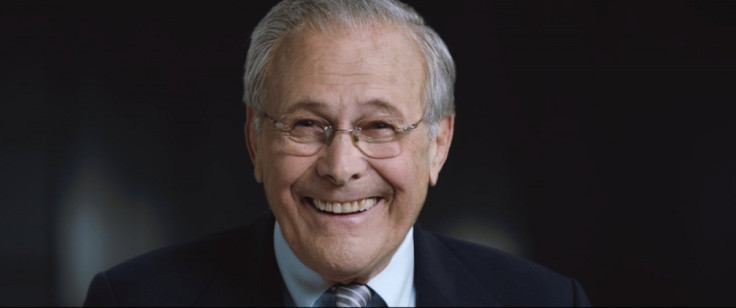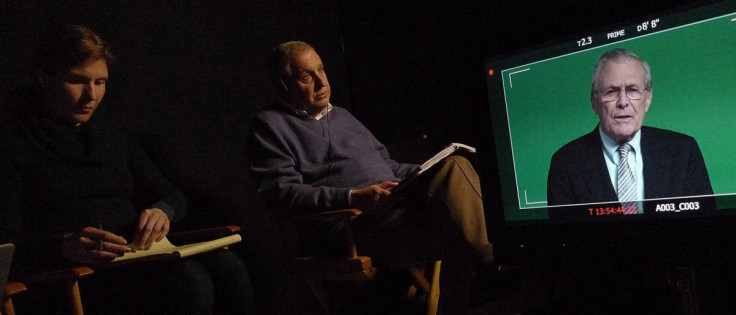Filmmaker Errol Morris: Ex-US Defence Secretary Donald Rumsfeld and the Venality of Evil

"I think it's one of my best movies, but what do I know. I've made a fair number of movies about cluelessness and self-deception, but I'll never do better than this one."
This is the bold claim upon which Errol Morris opens our interview. The US filmmaker, who won an Oscar for 2003 documentary The Fog of War, is speaking ahead of the release of his new movie, The Unknown Known. Like The Fog of War, the film is based around an interview with a former US Secretary of Defense, but instead of Robert McNamara, his latest feature focuses on the much more recent, and more controversial, Donald Rumsfeld.
Snowflakes
Serving as defence secretary under Gerald Ford and George W Bush, Rumsfeld was instrumental in orchestrating the US invasion of Iraq under the pretence that the Saddam Hussein regime possessed weapons of mass destruction (WMDs).
The film focuses on the thousands of memos on small white pieces of paper, dubbed "snowflakes", which Rumsfeld sent out during his two stints in office. Morris seizes on one he made in reference to his now famous 2002 press conference, upon which Rumsfeld was asked what evidence there was that Saddam Hussein had WMDs.
He responded by saying there were known knowns (things that we know we know); known unknowns (things that we know we don't know); and unknown unknowns (things that we don't know we don't know).
His snowflake acknowledges that he missed out the fourth option, the unknown known - things that you don't know you know. But what does that actually mean? Morris argues that behind this contradictory web of words and phrases lies a man who used language to obfuscate knowledge to make it correlate to his own beliefs.
The unknown knowns — things that you possibly may know that you don’t know you know.
"The issue is not the unknown known, or the known unknown, or any concoction of any of those words you conjure up, it's between knowledge and belief. How can we turn what might be nonsense, what might be falsehood, in to something as credible knowledge?" he says.
"At the heart of my movie, it's what I would call the devaluation of evidence, what evidence means. I sometimes think it's a return, particularly in Rumsfeld's case, a return to something before the enlightenment, before the scientific revolution. When you look closely at what he says, what you end up with is a feeling of horror. Evidence gets replaced by dogma. It's politics by jihad, by declaration.
"It's remarkable. He descends to his own gobbledygook. He can't even make sense out of his own nonsense."
"A Human Sausage"
Whilst in The Fog of War McNamara acknowledged the mistakes made as defence secretary during the Vietnam War, in The Unknown Known Rumsfeld is much more evasive, remaining unapologetic over Iraq and cautious in how he answers questions about it.
"I expected somebody more reflective, a person more touched by the events around him," says Morris.
It's remarkable. He descends in to his own gobbledygook. He can't even make sense out of his own nonsense.
"It's like dealing with some kind of human sausage, some kind of weird meat by-product, there's just no one there."
Morris says that whilst the interview was frustrating, what was both equally fascinating and frightening was seeing just how little personality was behind those big glasses Rumsfeld wears.
"McNamara I felt was endlessly evasive, and at times remarkably forthcoming, but I felt there was a person in front of my camera thinking about stuff. With Rumsfeld, I felt this absence of thinking, not even evasion. A non-engagement with the world. It's a remarkable thing to feel but I think that's what I was watching," he says.

The Venality of Evil
Morris has spoken to plenty of unpleasant individuals over the course of his near 40-year career. One of his early unfinished projects involved multiple interviews with notorious serial killer Ed Gein, and his later film Mr Death focused on execution technician, and holocaust denier, Fred A. Leuchter. Out of all these interviewees where would he rank Rumsfeld?
"It's sort of like the Dante-esque scale. What's at the bottom of the inferno? Is it not treachery and betrayal? The feeling the ideals of democracy, the ideals of a modern country, are being betrayed?" he says.
It's like dealing with some kind of human sausage, some kind of weird meat by-product, there's just no there there.
"It's not the more familiar version of evil, but evil as a kind of disengagement and thoughtlessness. I've coined a new phrase for it, 'the venality of evil'. The guy [Rumsfeld] who is so cocksure of himself, so in love with his own bulls**t, that he sees nothing, absolutely nothing."
Rumsfeld remains unrepentant over his involvement in the war and fails to even acknowledge the devastating effect of his actions when he was Secretary of Defence. The invasion of Iraq might still feel fresh, but as Morris argues, it will be a long time before the United States will be able to fully address the root cause of, and ultimate consequences, of going to war.
As he says in his final line to me: "I know less about why we went to war in Iraq as a result of making this movie".
The Unknown Known will be released in UK cinemas nationwide from 21 March. To find out more infromation about the film go to http://dogwoof.com/theunknownknown
© Copyright IBTimes 2025. All rights reserved.






















